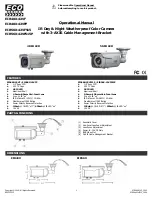
If any (or all) camera functions are lost, many times the best course of action is to
disconnect the cable connector from the back of the camera and check to see if the power
and control voltages are present at the connector. Typical connector pinouts and voltage
levels are given in section 2.8 of this manual. If your specific camera is fitted with a
customer-specified connector, this wiring will be defined by a special drawing typically in
the addendum to this manual.
Normally, all voltage levels present at this connector are referenced to Signal Common
(normally Pin 1.) Camera power should be b11 and +30VDC. The command
lines for ZOOM, FOCUS, and EXPOSURE MODE should all be approximately 0 VDC
without any input from the front panel switches on the remote control unit. With the
switches actuated, the level on the selected line should go to approxi12 or - 12
VDC. Actual level is really not critical. The internal interface assembly will accept voltages
from approxi/-9 VDC to over +/-20 VDC.
If all video has been lost, use a standard DVM on the ohm scale to check the center
conductor of the coax for continuity. This is normally Pin 2 on the standard connector, and
exits the ROS controller on the middle pin of the BNC connector on the rear panel. Normal
resistance should only be a few ohms unless the system cable is extremely long.
If all appears well at this point, the next step is to open up the camera housing and check
the Universal Interface Board for proper operation.
5.2 CAMERA DISASSEMBLY
The CE-X, 36:1 Camera Assembly is fairly easy to disassemble.
1)
Remove the stainless steel snap ring retaining the rear endbell to the camera
housing.
2)
Remove the seal screw in the rear endbell.
Next Very Carefully:
3)
Use a standard air chuck (preferably with a rubber tip) to slowly pressurize
the housing until the camera slides out the back. Do not pressurize too
quickly or the camera may tend to become airborne as it exits the housing.
4)
Once the camera electronics assembly is out of the housing it should be
placed on a non-conductive surface and secured to prevent accidental
damage.
5.3 CAMERA OPERATIONAL CHECKS
On a camera with either "Y" and "C" or balanced video where a picture is not displayed on
the receiving monitor, fuse F1 and F2 on the Mode Selection board assembly should be
checked for continuity. These are 1/8A fuse elements that protect the camera module and
51-17568 REV B
20
Summary of Contents for CE-X-36
Page 15: ...51 17568 REV B 9...




































